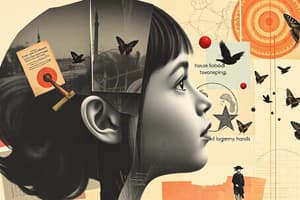Podcast
Questions and Answers
At what age do many children recognize themselves in a mirror?
At what age do many children recognize themselves in a mirror?
- 30-36 months
- 8-10 months
- 15-18 months (correct)
- 20-24 months
What is the term for the perception about oneself?
What is the term for the perception about oneself?
- Self-awareness
- Self-concept (correct)
- Self-image
- Self-efficacy
What is the name of the experiment that demonstrates self-awareness in infants?
What is the name of the experiment that demonstrates self-awareness in infants?
- Mirror experiment
- Dot-of-lipstick experiment
- Self-discovery experiment
- Dot-of-rouge experiment (correct)
At what age do children exhibit embarrassment and shame?
At what age do children exhibit embarrassment and shame?
What is included in a person's self-concept?
What is included in a person's self-concept?
What is the term for the ability to control objects outside of oneself?
What is the term for the ability to control objects outside of oneself?
At what age do children recognize their own photograph?
At what age do children recognize their own photograph?
What is the term for the development of self-understanding throughout the lifespan?
What is the term for the development of self-understanding throughout the lifespan?
What is a characteristic of self-concept in early childhood?
What is a characteristic of self-concept in early childhood?
What is a characteristic of self-concept in middle and late childhood?
What is a characteristic of self-concept in middle and late childhood?
What is perspective taking in the context of self-concept development?
What is perspective taking in the context of self-concept development?
What is a characteristic of self-concept in adolescence?
What is a characteristic of self-concept in adolescence?
What is the term for the idea we have of ourselves as individuals?
What is the term for the idea we have of ourselves as individuals?
What is a characteristic of self-concept in adulthood?
What is a characteristic of self-concept in adulthood?
What is the term for the idea of what a person may be, would like to be, and is afraid of becoming?
What is the term for the idea of what a person may be, would like to be, and is afraid of becoming?
According to Selman, what is the development of perspective taking?
According to Selman, what is the development of perspective taking?
What is the primary focus of the Ideal Self concept?
What is the primary focus of the Ideal Self concept?
What is Self-Efficacy according to Bandura?
What is Self-Efficacy according to Bandura?
What is the purpose of the 'Ideal Self' concept?
What is the purpose of the 'Ideal Self' concept?
What is the focus of 'Self-Worth' development?
What is the focus of 'Self-Worth' development?
What is the primary source of Self-Efficacy?
What is the primary source of Self-Efficacy?
What is the characteristic of Self-Efficacy?
What is the characteristic of Self-Efficacy?
What is the purpose of Activity 2: Ideal Self – Role Models?
What is the purpose of Activity 2: Ideal Self – Role Models?
What is the relationship between Self-Worth and Self-Efficacy?
What is the relationship between Self-Worth and Self-Efficacy?
What is the primary distinction between the development of Self-Worth and the Ideal Self concept?
What is the primary distinction between the development of Self-Worth and the Ideal Self concept?
What is the primary function of the Bodily Self in the context of the Ideal Self concept?
What is the primary function of the Bodily Self in the context of the Ideal Self concept?
According to Bandura, what is the primary outcome of developing self-efficacy in a particular skill or situation?
According to Bandura, what is the primary outcome of developing self-efficacy in a particular skill or situation?
What is the primary objective of Activity 2: Ideal Self – Role Models?
What is the primary objective of Activity 2: Ideal Self – Role Models?
What is the primary similarity between Self-Worth and Self-Efficacy?
What is the primary similarity between Self-Worth and Self-Efficacy?
Flashcards are hidden until you start studying
Study Notes
Development of Self-Concept
- Self-concept: perception about oneself; includes traits, preferences, social roles, values, beliefs, interests, and self-categorization
- Components of identity: career, political views, religious beliefs, relationships, ethnic identity, personality, and body image
Self-Awareness in Infancy
- Infants recognize themselves in a mirror by 15-18 months
- Infants learn to distinguish their physical self from the environment
The Developing Sense of Self
- Infants have a basic sense of self by a few months old
- By 8 months, infants' sense of self becomes more distinct
- By 18-20 months, children respond to separation from caregivers with distress
- By 30 months, children recognize their own photographs
- By 2 years, children exhibit self-awareness through embarrassment, shame, self-assertion, and language use
Self in Early Childhood
- Confusion of self, mind, and body
- Concrete descriptions of self
- Physical descriptions of self
- Behavioral descriptions of self
- Overestimation of abilities
Self in Middle and Late Childhood
- Shift to internal traits and abilities
- Social role descriptions
- Real and ideal selves
- More realistic about abilities
- Development of perspective-taking ability
Development of Perspective Taking (Selman, 1980)
- Stages of perspective-taking development
Self in Adolescence
- Abstract and idealistic self-concept
- Self-consciousness and preoccupation
- Contradictions within self
- Fluctuating self-concept across time and situations
- Comparison of real and ideal selves
- Possible selves (what persons may be, would like to be, and are afraid of becoming)
Self in Adulthood
- Self-awareness and emotional intelligence
- Acceptance of good and bad qualities
- More realistic possible selves
- Life review and evaluation of successes and failures
Self-Concept (Bandura, Erikson, Rogers)
- Consists of self-worth, ideal self, and self-efficacy
- Self-worth: meaning, purpose, and living up to one's identity and destiny
Ideal Self
- The ideal self is the kind of person one would like to be
- Intellectual self (intelligence and decision-making)
- Emotional self (emotions and self-esteem)
- Bodily self (physical care and well-being)
Self-Efficacy
- Bandura's theory: developing competence leads to a sense of self-efficacy
- Self-efficacy: confidence in controlling one's motivation, behavior, and social environment
- Situation-specific: varying levels of self-efficacy in different contexts
Development of Self-Concept
- Self-concept: perception about oneself; includes traits, preferences, social roles, values, beliefs, interests, and self-categorization
- Components of identity: career, political views, religious beliefs, relationships, ethnic identity, personality, and body image
Self-Awareness in Infancy
- Infants recognize themselves in a mirror by 15-18 months
- Infants learn to distinguish their physical self from the environment
The Developing Sense of Self
- Infants have a basic sense of self by a few months old
- By 8 months, infants' sense of self becomes more distinct
- By 18-20 months, children respond to separation from caregivers with distress
- By 30 months, children recognize their own photographs
- By 2 years, children exhibit self-awareness through embarrassment, shame, self-assertion, and language use
Self in Early Childhood
- Confusion of self, mind, and body
- Concrete descriptions of self
- Physical descriptions of self
- Behavioral descriptions of self
- Overestimation of abilities
Self in Middle and Late Childhood
- Shift to internal traits and abilities
- Social role descriptions
- Real and ideal selves
- More realistic about abilities
- Development of perspective-taking ability
Development of Perspective Taking (Selman, 1980)
- Stages of perspective-taking development
Self in Adolescence
- Abstract and idealistic self-concept
- Self-consciousness and preoccupation
- Contradictions within self
- Fluctuating self-concept across time and situations
- Comparison of real and ideal selves
- Possible selves (what persons may be, would like to be, and are afraid of becoming)
Self in Adulthood
- Self-awareness and emotional intelligence
- Acceptance of good and bad qualities
- More realistic possible selves
- Life review and evaluation of successes and failures
Self-Concept (Bandura, Erikson, Rogers)
- Consists of self-worth, ideal self, and self-efficacy
- Self-worth: meaning, purpose, and living up to one's identity and destiny
Ideal Self
- The ideal self is the kind of person one would like to be
- Intellectual self (intelligence and decision-making)
- Emotional self (emotions and self-esteem)
- Bodily self (physical care and well-being)
Self-Efficacy
- Bandura's theory: developing competence leads to a sense of self-efficacy
- Self-efficacy: confidence in controlling one's motivation, behavior, and social environment
- Situation-specific: varying levels of self-efficacy in different contexts
Studying That Suits You
Use AI to generate personalized quizzes and flashcards to suit your learning preferences.




